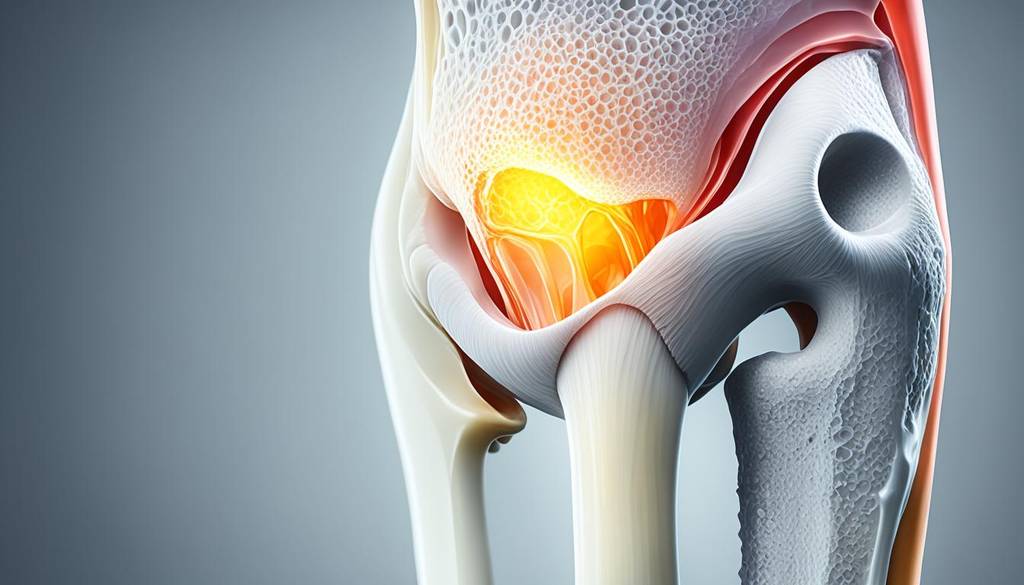Did you know that collagen is a key component in bones, skin, muscles, and other body parts? It’s true! Collagen is a protein that is naturally produced by the body and is essential for healthy joints, skin, bones, muscles, and more. But here’s the surprising part: as we age, our body’s collagen production decreases, leading to various issues. That’s where collagen supplementation comes in. Collagen supplements have gained popularity as a way to increase collagen levels in the body and reap the benefits it offers.
Key Takeaways:
- Collagen is a key component in bones, skin, muscles, and other body parts.
- As we age, our body’s collagen production decreases, leading to various issues.
- Collagen supplementation can help increase collagen levels in the body.
- Collagen offers numerous benefits, including improved skin health, relief from joint pain, prevention of bone loss, and more.
- It’s always recommended to consult with a healthcare professional before starting any new supplement regimen.
Introduction to Collagen and Its Importance
Collagen, the most abundant protein in the body, plays a crucial role in maintaining the health and structure of various tissues. It provides strength and elasticity to the skin, supports healthy joints and bones, and contributes to muscle mass.
Collagen can be obtained from natural food sources like pork skin, bone broth, and certain types of fish. It is also available in the form of supplements, which are typically hydrolyzed to enhance absorption. These supplements can contain different types of collagen, each with its own unique benefits and functions.
Overall, collagen is essential for overall wellness and can have a positive impact on various aspects of health, including skin health, joint function, bone strength, and muscle development.
Collagen sources
| Collagen Source | Description |
|---|---|
| Pork Skin | Rich in collagen protein, often used in traditional dishes |
| Bone Broth | A nutritious broth made from simmering animal bones and connective tissues, which contains collagen |
| Fish | Some fish, such as salmon and cod, contain collagen in their skin and bones |
Collagen can also be easily incorporated into a daily routine through the use of supplements, allowing individuals to efficiently boost their collagen levels and reap its many benefits.
Improving Skin Health: The Role of Collagen
Collagen is a vital component for maintaining healthy skin. It plays a key role in skin elasticity, allowing it to stretch and return to its original state. Unfortunately, as we age, our body’s natural collagen production decreases, leading to a loss of elasticity and the formation of wrinkles.
Collagen supplementation has shown promising results in improving skin health. Studies have demonstrated that collagen supplements can enhance skin elasticity and reduce the visible signs of aging. By increasing collagen levels, these supplements help the skin retain moisture, resulting in improved hydration and a reduction in the appearance of fine lines and wrinkles.
However, it’s important to note that while there is scientific evidence supporting the benefits of collagen for skin health, some claims may be based on anecdotal evidence and lack scientific research. To ensure personalized advice and recommendations, it is always recommended to consult with a dermatologist or skincare professional.

Collagen’s Effect on Skin Elasticity
Collagen plays a crucial role in maintaining skin elasticity. It provides structural support to the skin, allowing it to remain firm and resilient. As collagen levels decline with age, the skin becomes less elastic, resulting in sagging and the formation of wrinkles.
By supplementing with collagen, it is possible to replenish the declining levels and support the skin’s elasticity. This can lead to a more youthful appearance, as the skin regains its ability to stretch and bounce back.
Hydration and Wrinkle Reduction
Collagen also plays a role in skin hydration, which is essential for maintaining a youthful complexion. It has the ability to attract and retain moisture, keeping the skin hydrated and plump. This increased hydration can help reduce the appearance of fine lines and wrinkles, giving the skin a smoother and more youthful appearance.
Additionally, collagen supplementation can stimulate the production of natural moisturizing factors in the skin, further contributing to enhanced hydration and wrinkle reduction.
Anecdotal Evidence Versus Scientific Proof
While there is scientific research supporting the benefits of collagen for skin health, it’s important to distinguish between anecdotal evidence and scientific proof. Anecdotal evidence refers to personal experiences and testimonials, which may vary from person to person and lack scientific backing.
Scientific studies, on the other hand, provide more reliable evidence by following rigorous research protocols and analyzing objective data. These studies have demonstrated the positive effects of collagen supplementation on skin elasticity, hydration, and wrinkle reduction.
When considering the impact of collagen on skin health, it is important to rely on scientific research and consult with skincare professionals for personalized advice and recommendations.
Joint Pain Relief: How Collagen Can Help
Collagen plays a crucial role in joint health and can provide much-needed relief from joint pain. As we age, our body’s natural production of collagen decreases, leading to joint deterioration and an increased risk of conditions like osteoarthritis. Fortunately, collagen supplementation has been shown to improve symptoms associated with osteoarthritis, such as joint stiffness and pain.
One way collagen helps with joint pain relief is by maintaining the integrity of cartilage, the cushioning tissue between joints. Collagen supports overall joint health by stimulating collagen production in the joints, reducing inflammation, and providing relief from joint pain.
However, it’s important to note that collagen supplementation may not be a standalone treatment for conditions like arthritis. It’s always recommended to consult with a healthcare professional for personalized advice and treatment options tailored to your specific needs.

| Benefits of Collagen for Joints | How Collagen Helps |
|---|---|
| Relieves joint pain | Reduces inflammation and stimulates collagen production |
| Improves joint stiffness | Maintains the integrity of cartilage |
| Supports overall joint health | Reduces the risk of joint deterioration |
What Can Collagen Do for You?
Collagen offers numerous benefits for overall health and wellness. It is essential for maintaining the health and integrity of various tissues in the body, including the skin, joints, bones, and muscles. Collagen supplementation can promote skin health, improve joint function, prevent bone loss, boost muscle mass, support cardiovascular health, aid digestion and gut health, strengthen hair and nails, and potentially have positive effects on mood, cognitive function, weight management, and metabolism.
These benefits are supported by scientific research, although some claims may also be based on anecdotal evidence. Collagen supplements are available in different forms, including powders and capsules, and can contain various types of collagen. It’s important to choose high-quality supplements and consult with a healthcare professional before starting any new supplement regimen.

Collagen supplementation offers a wide range of benefits for overall wellness. From promoting skin health and joint function to aiding digestion and supporting cardiovascular health, collagen plays a vital role in maintaining the health and vitality of the body. With the diverse benefits it provides, collagen can be a valuable addition to your overall wellness routine.
Collagen’s Impact on Bone Density and Strength
Collagen plays a crucial role in maintaining bone density and strength. As a major component of bone tissue, collagen provides the framework for minerals like calcium to bind to, forming strong and healthy bones. Studies have shown that collagen supplementation can help prevent bone loss, reduce the risk of conditions like osteoporosis, and improve bone health, especially in postmenopausal women (Table 1).

“Collagen supplementation has been shown as an effective way to prevent bone loss and improve bone health, particularly for individuals at risk of osteoporosis.”
Collagen also plays a crucial role in the absorption and utilization of calcium and vitamin D, two essential nutrients for bone health. By supporting the proper utilization of these nutrients, collagen supplements can help maintain bone density and strength, reducing the risk of fractures and improving overall bone health (Table 2).
| Table 2: The Relationship between Collagen, Calcium, and Vitamin D in Bone Health |
|---|
| Collagen helps provide the framework for minerals like calcium to bind to, forming strong and healthy bones. |
| Collagen supplementation can support the absorption and utilization of calcium and vitamin D, crucial nutrients for bone health. |
| Collagen supplements can help maintain bone density and strength, reducing the risk of fractures and improving overall bone health. |
It’s important to note that while collagen supplementation can be beneficial for bone health, it should not replace other essential nutrients and lifestyle factors necessary for optimal bone health. Consulting with a healthcare professional is always recommended to receive personalized advice on bone health and osteoporosis prevention.
The Benefits of Collagen for Muscle Mass
Collagen is an important component of muscle tissue and plays a significant role in muscle growth and development. It provides structure and support to muscles, allowing them to contract and function effectively.
Research has shown that collagen supplementation can increase muscle mass and strength, particularly when combined with resistance training. Collagen helps stimulate protein synthesis, which is the process of building and repairing muscle tissue. By enhancing protein synthesis, collagen supplements support muscle recovery and reduce post-workout muscle soreness.
Strength training exercises, such as weightlifting, can greatly benefit from collagen supplementation. It enhances the benefits of strength training by promoting muscle growth and preventing muscle breakdown. Including collagen as part of a strength training regimen can lead to improved muscle mass and increased strength.
It’s important to note that while collagen plays a role in muscle growth, other factors such as adequate protein intake and overall nutrition, as well as regular exercise, are also essential for optimal muscle development. Consulting with a fitness professional or nutritionist can provide personalized advice on muscle growth and training.
Incorporating collagen supplements into a well-rounded fitness routine can contribute to overall muscle health and support your strength training goals.

Cardiovascular Health: Collagen’s Potential Heart Benefits
Collagen plays a vital role in maintaining cardiovascular health and may offer potential benefits for heart health. The structure and support provided by collagen are essential for the health and function of arteries, which are responsible for carrying oxygenated blood from the heart to the rest of the body. Improved arterial health can help prevent conditions like atherosclerosis, characterized by the narrowing of arteries and an increased risk of heart attacks and strokes.
Scientific research has shown that collagen supplementation can enhance arterial health by reducing stiffness in the arteries. This improved flexibility and elasticity can contribute to better blood flow and overall cardiovascular well-being. It’s important to note that collagen supplements may also have positive effects on HDL (good) cholesterol levels. Adequate levels of HDL cholesterol are crucial for maintaining heart health and reducing the risk of cardiovascular diseases.
While collagen can play a role in heart health, it’s important to consider other factors such as maintaining a healthy diet, engaging in regular exercise, and adopting overall lifestyle habits that promote cardiovascular wellness. Consulting with a healthcare professional can provide personalized advice on how to optimize heart health and prevent cardiovascular disease.
Arterial Health and Collagen Supplementation
Collagen supplementation has demonstrated promising effects on arterial health and can contribute to the prevention of atherosclerosis. Arteries are responsible for carrying oxygen-rich blood from the heart to the rest of the body. Over time, factors such as aging and lifestyle choices can lead to the buildup of cholesterol, fats, and other substances in the arteries, causing them to narrow and stiffen.
Studies have shown that collagen supplementation can help reduce arterial stiffness and promote artery flexibility. By improving the health and integrity of the arterial walls, collagen can enhance blood flow and reduce the risk of atherosclerosis. Well-maintained arteries are essential for optimal cardiovascular function and can help prevent heart-related complications.
Collagen’s Influence on HDL Cholesterol Levels
Collagen supplements may also have a positive impact on HDL (high-density lipoprotein) cholesterol levels. HDL cholesterol is commonly referred to as “good” cholesterol because it helps remove “bad” (LDL) cholesterol from the bloodstream, reducing the risk of plaque buildup in the arteries.
Studies have suggested that collagen supplementation can potentially increase HDL cholesterol levels, contributing to a healthier lipid profile and reducing the risk of cardiovascular disease. While more research is needed to fully understand the mechanisms behind collagen’s influence on HDL cholesterol, these preliminary findings indicate the potential cardiovascular benefits of collagen supplementation.
It’s important to note that while collagen can contribute to heart health and cardiovascular wellness, it should not replace other essential aspects of a heart-healthy lifestyle. Adopting a balanced diet, engaging in regular physical activity, managing stress, and avoiding tobacco use are also crucial for maintaining optimal cardiovascular health.
| Benefit | Collagen’s Impact |
|---|---|
| Improved Arterial Health | Reduces stiffness in the arteries and promotes better blood flow |
| Positive Effect on HDL Cholesterol Levels | May increase levels of “good” cholesterol, which helps remove “bad” cholesterol from the bloodstream |
Collagen’s potential benefits for heart health make it a valuable consideration for those looking to support their cardiovascular wellness. However, it’s essential to consult with a healthcare professional before starting any supplementation regimen or making significant lifestyle changes.
Collagen: A Digestive Aid and Gut Health Promoter
Collagen plays a crucial role in supporting digestion and promoting gut health. By maintaining a balanced gut microbiome, collagen supplementation can have a positive impact on our overall digestive well-being.
Collagen and Gut Microbiome Balance
The gut microbiome consists of trillions of microorganisms that reside in our digestive tract. These microorganisms play a vital role in digesting food, absorbing nutrients, and supporting our immune system. An imbalance in the gut microbiome can lead to digestive issues and other health concerns.
Collagen supplements can help promote a balanced gut microbiome by increasing the levels of beneficial bacteria and reducing the abundance of harmful bacteria. The amino acids present in collagen, such as glycine and glutamine, provide nourishment for the gut lining and support the growth of healthy bacteria.
This balance in the gut microbiome is essential for optimal digestion, nutrient absorption, and overall gut health.
Addressing Leaky Gut Syndrome with Collagen
Leaky gut syndrome is a condition where the lining of the gut becomes damaged, allowing undigested food particles, toxins, and bacteria to enter the bloodstream. This can lead to inflammation, immune system dysfunction, and various digestive symptoms.
Collagen can help support gut lining integrity and address leaky gut syndrome. The amino acids in collagen, such as proline and hydroxyproline, play a crucial role in maintaining and repairing the gut lining. By enhancing the integrity of the gut barrier, collagen can help prevent the passage of harmful substances into the bloodstream.
Furthermore, collagen supplementation can promote a healthy gut environment by reducing inflammation, soothing gut lining, and supporting the growth of beneficial bacteria.
When combined, these benefits make collagen an effective aid in supporting digestion and improving gut health.
Collagen for Hair and Nail Strength: What to Expect
Collagen plays a crucial role in promoting the strength and vitality of both hair and nails. It provides essential nutrients and support to the structure of hair follicles and nails, contributing to their overall health and appearance.
When it comes to hair health, collagen supplementation can lead to improvements in thickness, strength, and growth. By nourishing the hair follicles, collagen helps reduce breakage and brittleness, resulting in stronger and more resilient hair strands. Additionally, collagen supports the production of keratin, a protein that forms the structure of hair, further enhancing its health and growth.
Similarly, collagen is beneficial for nail health, helping to strengthen and enhance their appearance. Collagen supplementation provides the necessary building blocks for healthy nail growth, reducing the likelihood of brittle nails that are prone to breakage. With regular collagen intake, nails can become stronger, smoother, and less prone to damage.
It’s important to note that the effectiveness of collagen for hair and nail health can vary from person to person. Factors such as individual genetics, overall health, and lifestyle choices can also influence the outcomes. Therefore, it’s recommended to consult with a dermatologist or healthcare professional for personalized advice on hair and nail care.
To summarize, collagen supplementation can be a valuable addition to your beauty routine for promoting the strength and growth of both hair and nails. It provides essential nutrients and structural support, helping to improve the overall health and appearance of these features.
Collagen, Mood, and Cognitive Benefits
Collagen may have potential benefits for mood and cognitive function. While specific scientific research on collagen’s effects on mood and cognitive health is limited, some anecdotal evidence suggests that collagen supplementation may have positive effects on mood and reduce symptoms of anxiety. Our psychological well-being is closely linked to our physical well-being, and collagen’s benefits for other aspects of health, such as skin and joint health, may indirectly contribute to improved mood and cognitive function. Further research is needed to better understand the relationship between collagen and mental health. It’s always recommended to consult with a healthcare professional for personalized advice on mood and cognitive health.
Examining Collagen’s Role in Weight Management and Metabolism
Collagen may play a significant role in weight management and metabolism. While further research is needed to fully understand the effects of collagen on weight loss and metabolism, some studies suggest that collagen supplementation can have positive impacts. One potential benefit is its ability to promote a feeling of fullness, which may lead to reduced calorie intake and potential weight loss.
Furthermore, collagen’s unique amino acid profile and its role in muscle mass maintenance may contribute to increased energy expenditure and metabolism. As collagen supports muscle health, it may help maintain a higher metabolic rate, potentially leading to more efficient calorie burning.
However, it’s crucial to note that collagen is not a magic solution for weight loss. Healthy weight management requires a holistic approach, including a balanced diet and regular exercise. Collagen should be seen as a complement to an overall healthy lifestyle, rather than a standalone weight loss solution. Consulting with a healthcare professional or nutritionist can provide personalized advice on weight management and metabolism.
Conclusion
In conclusion, collagen is a powerful protein that offers a wide range of benefits for overall health and wellness. Its role in maintaining the health and integrity of various tissues, including the skin, joints, bones, and muscles, makes it a vital component of a healthy lifestyle. Scientific research supports many of the claimed benefits of collagen supplementation, such as improved skin health, joint function, and muscle mass.
Collagen supplementation can also aid in preventing bone loss, supporting cardiovascular health, improving digestion and gut health, and strengthening hair and nails. Although some claims are based on anecdotal evidence, consulting with a healthcare professional is always recommended before starting any new supplement regimen.
Incorporating collagen into your wellness routine can enhance overall well-being and contribute to a comprehensive approach to health. However, it’s important to note that collagen should not be considered a miracle solution on its own. Prioritizing a healthy lifestyle, including a balanced diet, regular exercise, and other lifestyle factors, is essential for optimal results.
With its numerous benefits and potential positive effects on mood, cognitive function, weight management, and metabolism, collagen is a valuable addition to supporting your health and wellness goals. By consulting with professionals and incorporating collagen into your routine, you can unlock the diverse range of benefits that this protein has to offer.
FAQ
What can collagen do for you?
What does collagen do for your face?
Collagen, what does it do?
What does taking collagen do for you?
What are the types of collagen and what do they do?
What is collagen made from?
What is collagen used for?
What does hydrolyzed collagen mean?
Source Links
- https://www.healthline.com/nutrition/collagen-benefits
- https://horizonsplasticsurgery.com/uncovering-the-benefits-of-collagen-powder/
- https://www.purelyinspired.com/blogs/articles/does-collagen-protein-build-muscle


